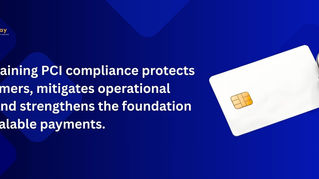top of page


Enjoy unmatched flexibility and security with USTPay
PCI Compliance refers to adherence to the Payment Card Industry Data Security Standards (PCI DSS), a set of security protocols designed to protect credit card data.
These standards are established by the PCI Security Standards Council (PCI SSC) and apply to any business that stores, processes, or transmits cardholder information.
Ensuring PCI compliance is crucial for safeguarding customer data, maintaining trust, and avoiding financial and legal consequences. Non-compliance can lead to severe penalties, security breaches, and damage to your organization’s reputation.
1. Build and Maintain a Secure Network
2. Protect Cardholder Data
3. Maintain a Vulnerability Management Program
4. Implement Strong Access Control Measures
5. Regularly Monitor and Test Networks
6. Maintain an Information Security Policy
Any business, regardless of size, that accepts, processes, or stores payment card information is required to comply with PCI DSS standards.
• Enhanced Security: Protect sensitive payment card information.
• Customer Trust: Build and maintain customer confidence in your business.
• Reduced Risk: Mitigate the likelihood of data breaches and fraud.
• Regulatory Compliance: Avoid hefty fines and legal repercussions.
PCI COMPLIANCE

Partner with UST for PCI Compliance
We meet with you when your PCI Compliance is due to help you through the recertification process required annually.
Rest easy with USTPay with our PCI Compliant Gateways.
Tokenization is a data security method that replaces sensitive information, such as credit card numbers or personal identifiers, with a unique identifier called a token.
This token has no exploitable value and cannot be used outside of the specific system where it was created.
1. Data Collection: Sensitive data, like a credit card number, is entered into a secure system.
2. Token Creation: The system generates a randomized token that represents the original data.
3. Storage: The sensitive data is securely stored in a centralized vault or database, while the token is used for transactions and processing.
4. Data Retrieval: When necessary, the token can be mapped back to the original data using the secure system, but only by authorized parties.
• Enhanced Security: By removing sensitive data from your systems, tokenization minimizes the risk of theft and fraud.
• Simplified Compliance: Tokenized systems help businesses meet stringent data protection regulations like PCI DSS by reducing the scope of sensitive data handling.
• Reduced Risk: Even if tokens are intercepted, they hold no value outside the specific environment.
• Customer Trust: Ensures better data protection, enhancing customer confidence in your services.
Encryption: Converts data into a scrambled format using a key. If the key is compromised, the data can be decrypted.
Tokenization: Replaces data with tokens that have no mathematical relationship to the original data, making it impossible to reverse-engineer.
Both methods enhance security but serve different purposes. Tokenization is particularly effective for protecting sensitive data during storage and transmission.
Data breaches are a constant threat.
Tokenization offers:
• A cost-effective way to secure sensitive data.
• Peace of mind knowing your customers’ information is safe.
• Compliance with industry and regulatory standards.
• Secure token generation and management.
• Flexible integration with your existing systems.
• Scalable solutions to meet the needs of growing businesses.
TOKENIZATION



Get Started with Real Time Tokenization
Protect your sensitive data and build trust with your customers. Contact us today to learn more about how our real time tokenization solution can safeguard your business.
SECURITY VAULTING
Security vaulting refers to the practice of securely storing sensitive information, such as payment data, personally identifiable information (PII), or intellectual property, in a highly protected environment. This data is isolated in a secure vault, reducing exposure to unauthorized access and potential breaches.
• Data Collection: Sensitive information is securely collected through encrypted channels to the PCI Compliant Gateways.
• Secure Vault Storage: The collected data is stored in a security vault, a highly fortified storage system that uses advanced access control measures.
• Controlled Access: Only authorized systems and personnel can retrieve data from the vault through secure access protocols.
Security vaulting offers a robust way to protect sensitive information.
It minimizes the risks associated with data breaches, insider threats, and compliance failures by centralizing and securing data in one place.
• Enhanced Data Security: Prevents unauthorized access with advanced encryption and access controls.
• Compliance Simplification: Eases adherence to regulations like PCI DSS by limiting sensitive data exposure.
• Risk Reduction: Centralized storage reduces the attack surface and potential vulnerabilities.
• Operational Efficiency: Streamlines data management while maintaining strict security standards.
Unlike traditional storage systems, security vaulting provides a highly fortified and centralized solution for safeguarding critical data.
By isolating sensitive information and implementing robust security protocols, vaulting minimizes the risk of data breaches and ensures compliance with stringent data protection standards.
Protect your most valuable asset—your data. Contact us today to learn how UST solutions can safeguard your business.


How Independent Card Vaulting Prevents Vendor Lock-In
Independent card vaulting is a PCI-compliant and secure method for storing customer credit card data in a protected and separate vault rather than on a merchant’s system.
3 days ago5 min read


Why PCI Compliance Matters and How to Achieve It
Learn why PCI compliance is essential for businesses handling card payments, the practical steps to achieve it, and how a provider like USTPay can simplify compliance while protecting customers and operations.
Feb 113 min read


Understanding Level 3 Data: The Hidden Cost Driver in GovCon Credit Card Processing
Learn how Level 3 data impacts GovCon credit card fees, compliance, and margins for SEWP, DoD ESI, and GSA contractors.
Dec 19, 20255 min read
bottom of page
